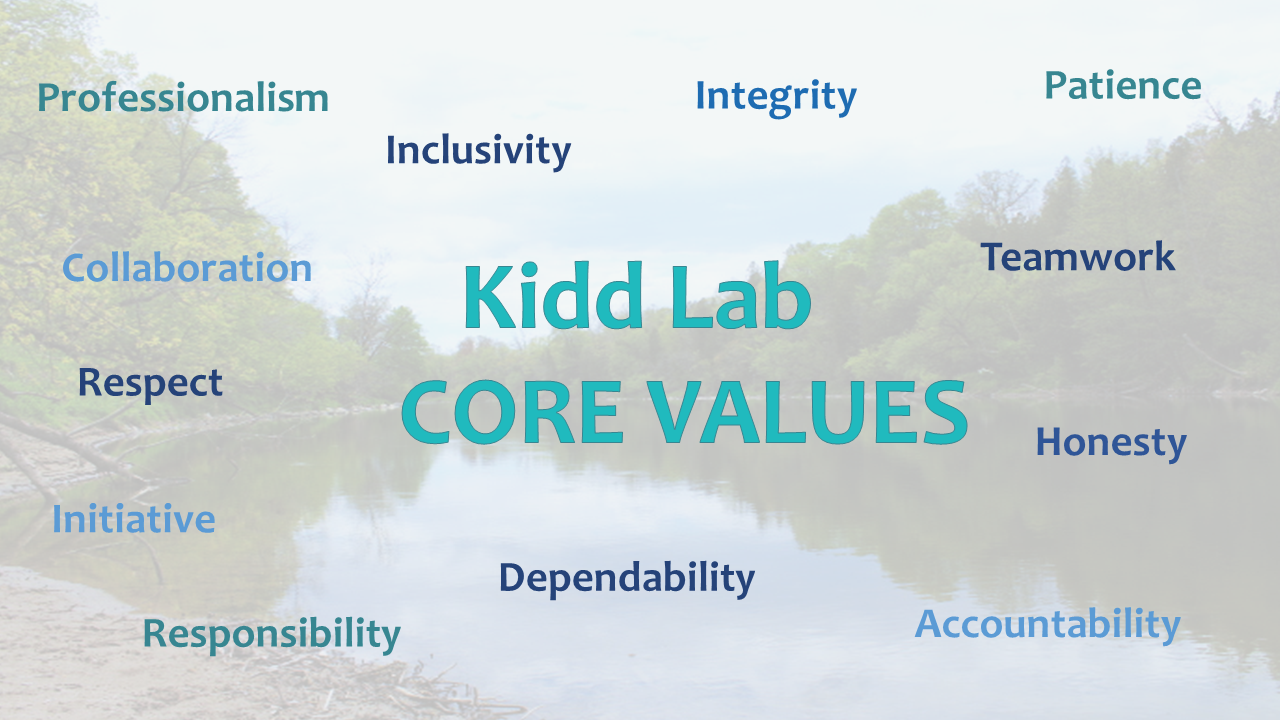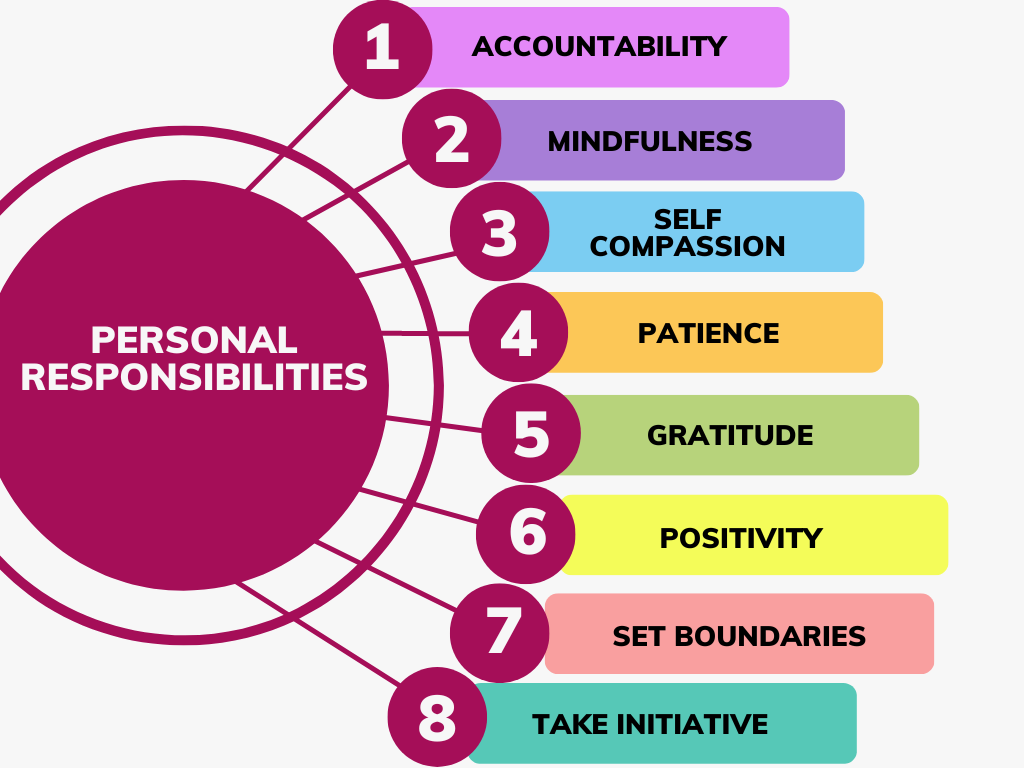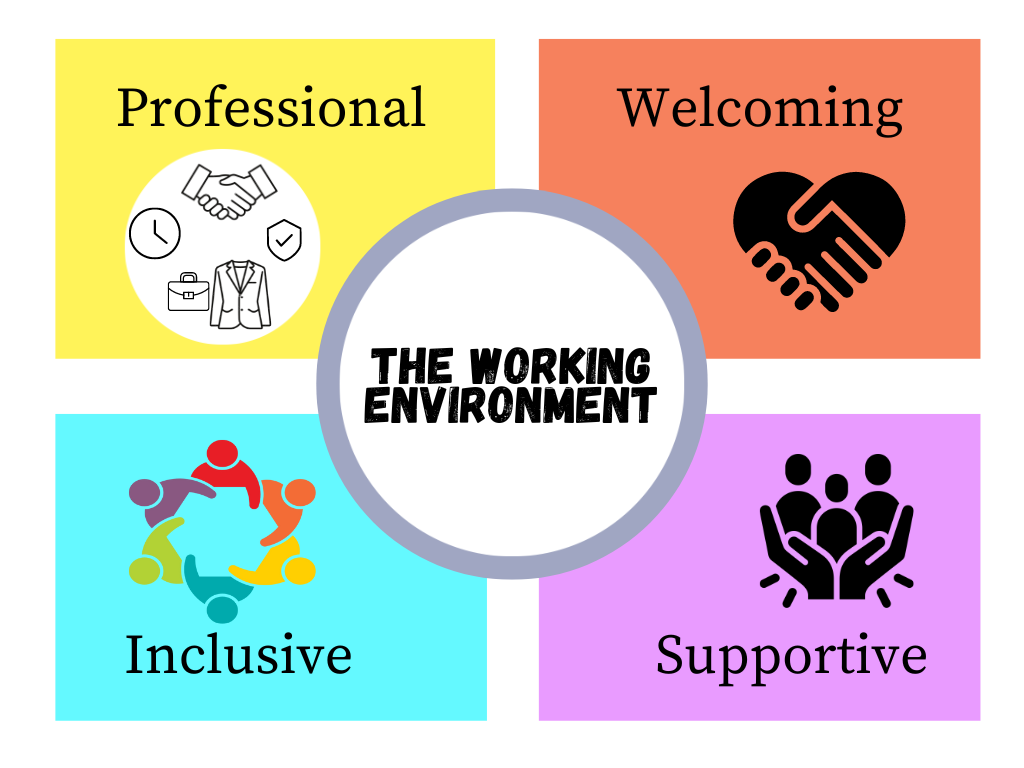Core Values
This list reflects values we expect from one another and ourselves. It is our shared responsibility to help one another uphold these values.
This list reflects values we expect from one another and ourselves. It is our shared responsibility to help one another uphold these values.
Alt text: A faded picture of the Grand River in the background with Kidd Lab Core Values title in the middle. Values listed one the image are: professionalism, inclusivity, integrity, patience, teamwork, honesty, accountability, dependability, responsibility, initiative, respect, and collaboration.
Our Personal Responsibilities
As individuals, we are responsible for being mindful of how we show up and respond to daily tasks, including wins and challenges that naturally arise. These 8 Personal Responsibilities are outlined to support a physically, emotionally, mentally, and spiritually healthy work life.
As individuals, we are responsible for being mindful of how we show up and respond to daily tasks, including wins and challenges that naturally arise. These 8 Personal Responsibilities are outlined to support a physically, emotionally, mentally, and spiritually healthy work life.
Alt text: A diagram showing a list of the lab personal responsibilities: There are 8 items with descriptions for each one. 1) Accountability - for your actions, 2) Mindfulness - of yourself and others, 3) Self-compassion - to make space for day-to-day highs and lows, 4) Patience - with yourself and others, 5) Gratitude - for yourself and others, 6) Positivity - in how we approach situations to be successful, 7) Set boundaries - for the benefit of a balanced life, and 8) Take initiative - to problem solve challenges and help others.
Workplace Culture
Building Community & Responsibilities to Others
We want a workplace that is professional, welcoming, inclusive, and supportive. The culture we aim to create supports diversity, inclusion, accessibility, and decolonization/reconciliation and allows all lab members to be their authentic selves.
Building Community & Responsibilities to Others
We want a workplace that is professional, welcoming, inclusive, and supportive. The culture we aim to create supports diversity, inclusion, accessibility, and decolonization/reconciliation and allows all lab members to be their authentic selves.
Alt text: A diagram identifying four workplace values with icons. Starting at the top left and moving clockwise around, the four values are: professionalism, welcoming, inclusive, and supportive.
Creating a Professional, Welcoming, Inclusive, and Supportive Environment
The following sections describe goals for all lab members that will help create a work environment that is professional, welcoming, inclusive and supportive. Acting on them will ensure that all lab members feel that they belong, have a voice, are comfortable sharing their opinions, have equal access to opportunities and resources, benefit as much as possible from their time in the lab, and feel valued.
The following sections describe goals for all lab members that will help create a work environment that is professional, welcoming, inclusive and supportive. Acting on them will ensure that all lab members feel that they belong, have a voice, are comfortable sharing their opinions, have equal access to opportunities and resources, benefit as much as possible from their time in the lab, and feel valued.
Create a Welcoming Environment
To ensure a welcoming workplace, we should contribute positive attitudes and behaviours. This will be accomplished by:
Create a Supportive Environment
To ensure a supportive workplace environment, we need to be understanding and compassionate with one another. This will be accomplished by:
Create an Inclusive Environment
We come from different cultures/backgrounds and support equity, diversity, inclusion, and decolonization/reconciliation. Our lab strives to create an inclusive workplace through:
Create a Professional Environment
Our lab has created and abides by the following list of professional expectations:
No Tolerance
Our lab has no tolerance for the following behaviours:
Reporting Unacceptable Behaviour & Consequences
University and Community Resources
Reaching out, communicating clearly, and asking for assistance is always the best way to approach any challenges, conflicts, or concerns. Reaching out to other members of the lab should be the first step to addressing any concerns within the group. First, try to address any issues with the person(s) directly involved. Secondly, you can bring up the issue with Karen who can help to resolve or mitigate any challenges.
However, there are some situations where further support is needed or if resolution cannot be reached alone. In some instances, you may want to get an outside opinion on the situation or have someone to talk to about challenges you are facing. The groups below, among others, are available to listen to you, help you navigate, and assist you in overcoming a wide variety of difficult situations. Many of these resources are also available as additional support to make your experience in the lab the best it can be. These resources are not designed to assist in a crisis scenario, instead to act as support through a difficult period.
McMaster Equity and Inclusion Office (EIO)
University Hall, Room 104
Email: [email protected]
Link: Home - Equity and Inclusion Office (mcmaster.ca)
Services:
McMaster OmBuds Office
McMaster University Student Centre, Room 210
Email: [email protected]
Link: https://www.mcmaster.ca/ombuds/
Mandate: independent, impartial and confidential process through which members of the University may pursue the just, fair, and equitable resolution of any student-related issue
Services:
McMaster University Student Centre, Basement B101
Email: [email protected]
Link: https://sas.mcmaster.ca/
Mandate: supporting students with disabilities through academic accommodations and related supports at McMaster
McMaster Student Wellness Centre (SCW)
Peter George Centre for Living and Learning (PGCLL) 210/201
Email: [email protected]
Telephone: (905) 525-9140, ext 27700 (used to book appointments)
Link: https://wellness.mcmaster.ca/
Mandate: health care and support to enhance the mental, physical, and personal well-being of Mcmaster students
Services:
Good2Talk
Free help-line, available 24/7
Mandate: Free, confidential helpline providing counselling, info and referrals for mental health, addictions, and well-being for post-secondary students
Telephone: 1-886-925-5454
The Kidd Lab Code of Conduct found inspiration using the following resources:
https://mckinneylab.weebly.com/lab-code-of-conduct.html - Sample lab code of conduct
https://pubs.acs.org/doi/full/10.1021/acscentsci.0c01120 - Twelve Principles Trainees, PIs, Departments, and Faculties Can Use to Reduce Bias and Discrimination in STEM - cited by Dr. Melissa McKinney
http://grad.biology.ualberta.ca/evenden/lab-code-of-conduct/ - Lab code of conduct referenced by Dr. McKinney
https://willisglycobiologylab.com/lab-code-of-conduct/ - Lab code of conduct referenced by Dr. McKinney
Global Water Futures Meeting Code of Conduct - GWF meeting code of conduct - 9 points
https://governance.usask.ca/governance/guidelines-for-academic-conduct.php#About - Guidelines for Academic Conduct - elaborates on Point 2 from GWF meeting conduct above
Indiana University of Bloomington Fieldwork Code of Conduct (Bystander Intervention) - Fieldwork code of conduct with suggestions for bystander intervention. Has a number of helpful pdf documents and links throughout the article (e.g. bystander intervention, sample code of conduct)
Global Code of Conduct for Research in Resource Poor Settings (International Example) - Has 4 core values (fairness, respect, care, honesty) and how to implement them
American Geophysical Union Meeting Code of Conduct - Meeting codes of conduct - acceptable behaviour, unacceptable behaviour, and reporting unacceptable behaviour
https://d32ogoqmya1dw8.cloudfront.net/files/advancegeo/resources/cedar_creek_ecosystem_science_reserve_code_conduct.pdf - Sample code of conduct - lists acceptable behaviour, unacceptable behaviour, and warning process, and how and who to reporting unacceptable behaviour to
https://secretariat.mcmaster.ca/app/uploads/Discrimination-and-Harassment-Policy.pdf - McMaster discrimination policy
https://equity.mcmaster.ca/app/uploads/2021/03/Remediated_Blue-Folder-McMasters-Discrimination-Harassment-Policy.pdf - McMaster resource - includes who to contact, how to respond to instances of harassment and discrimination (recognize, respond, refer) + definitions
https://msumcmaster.ca/app/uploads/2021/10/Employment-Policy-Violence-Discrimination-Harassment-1.pdf - Longer resource about harassment, violence, and discrimination with definitions and resources
https://popgenchenlab.github.io/diversity/ - Inclusion and diversity - with a statement and many resources
https://www.masterclass.com/articles/inclusion-in-the-workplace - Inclusion and benefits of having an inclusive work space
To ensure a welcoming workplace, we should contribute positive attitudes and behaviours. This will be accomplished by:
- Creating positive communications.
- Expressing gratitude regularly.
- Listening attentively and actively.
- Using mindful and inclusive language
Create a Supportive Environment
To ensure a supportive workplace environment, we need to be understanding and compassionate with one another. This will be accomplished by:
- Supporting each other’s learning and offering mentorship, guidance, and encouragement.
- Celebrating each other’s wins!
- Creating shared goals and providing help/support during points of failure.
- Encouraging collaboration, group discussions, and open communication between co-workers and during lab meetings.
- Respecting personal boundaries and privacy.
- Creating spaces and opportunities that support togetherness and interaction amongst lab members (e.g. include people in conversations, ask for opinions, ideas, etc.).
Create an Inclusive Environment
We come from different cultures/backgrounds and support equity, diversity, inclusion, and decolonization/reconciliation. Our lab strives to create an inclusive workplace through:
- Recognizing, respecting, and celebrating our different cultures, backgrounds, and demographics.
- Learning about the cultural celebrations, backgrounds and events of fellow lab members.
- Celebrating and making accommodations for cultural diversity.
- Asking questions respectfully and with an open mind and open heart.
- Treating people of all different races, ethnicities, gender identities, and sexual orientations with respect and kindness.
- Being aware of our own biases and considering how that informs our thoughts and actions.
- Being considerate about the different knowledge systems and beliefs others have.
- Providing individual work accommodations.
- Engaging in (optional) group activities inside and outside of the workplace.
- Offering equal opportunities for training, learning, accessing resources, and experiences to lab members.
- Not tolerating any discriminatory, abusive, or aggressive behaviour of any kind (verbal, written, physical) and addressing any of these behaviours quickly and professionally.
- Learning and discussing unconscious bias, microaggressions, neurodiversity, etc. in the workplace. Ask questions and share information with the group.
Create a Professional Environment
Our lab has created and abides by the following list of professional expectations:
- Conduct research with integrity, from experimental design and data collection through to communications with diverse audiences.
- Be respectful of the animals and resources we use and the environments in which we work.
- Be considerate of others in and out of the lab.
- Maintain and promote a positive working environment.
- Acknowledge and appreciate the contributions of others.
- Be punctual and be respectful of everyone’s time.
- Accept responsibility for mistakes and take action to fix your mistakes through learning and resolution approaches to avoid repeating the same mistakes. When possible, take proactive approaches to prevent mistakes.
- Ensure that laboratory and communal spaces are kept clean and organised.
- Follow safety guidelines and rules with respect to laboratory and field work that have been defined by McMaster, the Department of Biology and our lab group.
- Communicate clearly, effectively and with compassion.
- Be mindful of others schedules and provide sufficient notice when required.
- Use working time efficiently and effectively.
No Tolerance
Our lab has no tolerance for the following behaviours:
- Personal or professional gossiping
- Sexual harassment
- Bullying
- Hate symbols
- Threats
- Language and passing judgement that puts others down (verbal abuse)
- Discrimination, racism, and microaggressions are not tolerated.
- If you are unsure if something is discriminatory, racist, or a microaggression it is important to reach out to a member of the team and learn.
Reporting Unacceptable Behaviour & Consequences
- McMaster discrimination policy states, “All members of the University Community have a right to study, work, and live in an environment that is free of Discrimination and Harassment.” We uphold that policy.
- McMaster Discrimination and Harassment Policy https://secretariat.mcmaster.ca/app/uploads/Discrimination-and-Harassment-Policy.pdf
- McMaster resource connected to Discrimination and Harassment Policy - includes who to contact, how to respond to instances of harassment and discrimination (recognize, respond, refer), and definitions
University and Community Resources
Reaching out, communicating clearly, and asking for assistance is always the best way to approach any challenges, conflicts, or concerns. Reaching out to other members of the lab should be the first step to addressing any concerns within the group. First, try to address any issues with the person(s) directly involved. Secondly, you can bring up the issue with Karen who can help to resolve or mitigate any challenges.
However, there are some situations where further support is needed or if resolution cannot be reached alone. In some instances, you may want to get an outside opinion on the situation or have someone to talk to about challenges you are facing. The groups below, among others, are available to listen to you, help you navigate, and assist you in overcoming a wide variety of difficult situations. Many of these resources are also available as additional support to make your experience in the lab the best it can be. These resources are not designed to assist in a crisis scenario, instead to act as support through a difficult period.
McMaster Equity and Inclusion Office (EIO)
University Hall, Room 104
Email: [email protected]
Link: Home - Equity and Inclusion Office (mcmaster.ca)
Services:
- Human Rights and Dispute Resolution
- Inclusion and Anti-Racism Education
- Accessibility Program
- Sexual Violence and Prevention Response
McMaster OmBuds Office
McMaster University Student Centre, Room 210
Email: [email protected]
Link: https://www.mcmaster.ca/ombuds/
Mandate: independent, impartial and confidential process through which members of the University may pursue the just, fair, and equitable resolution of any student-related issue
Services:
- Appeals or petitions
- Academic dishonesty or research misconduct
- Supervisor/thesis issues
- Assist in pursuing resolution
McMaster University Student Centre, Basement B101
Email: [email protected]
Link: https://sas.mcmaster.ca/
Mandate: supporting students with disabilities through academic accommodations and related supports at McMaster
McMaster Student Wellness Centre (SCW)
Peter George Centre for Living and Learning (PGCLL) 210/201
Email: [email protected]
Telephone: (905) 525-9140, ext 27700 (used to book appointments)
Link: https://wellness.mcmaster.ca/
Mandate: health care and support to enhance the mental, physical, and personal well-being of Mcmaster students
Services:
- Counselling services
- Medical services
- Wellness programs
Good2Talk
Free help-line, available 24/7
Mandate: Free, confidential helpline providing counselling, info and referrals for mental health, addictions, and well-being for post-secondary students
Telephone: 1-886-925-5454
The Kidd Lab Code of Conduct found inspiration using the following resources:
https://mckinneylab.weebly.com/lab-code-of-conduct.html - Sample lab code of conduct
https://pubs.acs.org/doi/full/10.1021/acscentsci.0c01120 - Twelve Principles Trainees, PIs, Departments, and Faculties Can Use to Reduce Bias and Discrimination in STEM - cited by Dr. Melissa McKinney
http://grad.biology.ualberta.ca/evenden/lab-code-of-conduct/ - Lab code of conduct referenced by Dr. McKinney
https://willisglycobiologylab.com/lab-code-of-conduct/ - Lab code of conduct referenced by Dr. McKinney
Global Water Futures Meeting Code of Conduct - GWF meeting code of conduct - 9 points
https://governance.usask.ca/governance/guidelines-for-academic-conduct.php#About - Guidelines for Academic Conduct - elaborates on Point 2 from GWF meeting conduct above
Indiana University of Bloomington Fieldwork Code of Conduct (Bystander Intervention) - Fieldwork code of conduct with suggestions for bystander intervention. Has a number of helpful pdf documents and links throughout the article (e.g. bystander intervention, sample code of conduct)
Global Code of Conduct for Research in Resource Poor Settings (International Example) - Has 4 core values (fairness, respect, care, honesty) and how to implement them
American Geophysical Union Meeting Code of Conduct - Meeting codes of conduct - acceptable behaviour, unacceptable behaviour, and reporting unacceptable behaviour
https://d32ogoqmya1dw8.cloudfront.net/files/advancegeo/resources/cedar_creek_ecosystem_science_reserve_code_conduct.pdf - Sample code of conduct - lists acceptable behaviour, unacceptable behaviour, and warning process, and how and who to reporting unacceptable behaviour to
https://secretariat.mcmaster.ca/app/uploads/Discrimination-and-Harassment-Policy.pdf - McMaster discrimination policy
https://equity.mcmaster.ca/app/uploads/2021/03/Remediated_Blue-Folder-McMasters-Discrimination-Harassment-Policy.pdf - McMaster resource - includes who to contact, how to respond to instances of harassment and discrimination (recognize, respond, refer) + definitions
https://msumcmaster.ca/app/uploads/2021/10/Employment-Policy-Violence-Discrimination-Harassment-1.pdf - Longer resource about harassment, violence, and discrimination with definitions and resources
https://popgenchenlab.github.io/diversity/ - Inclusion and diversity - with a statement and many resources
https://www.masterclass.com/articles/inclusion-in-the-workplace - Inclusion and benefits of having an inclusive work space



